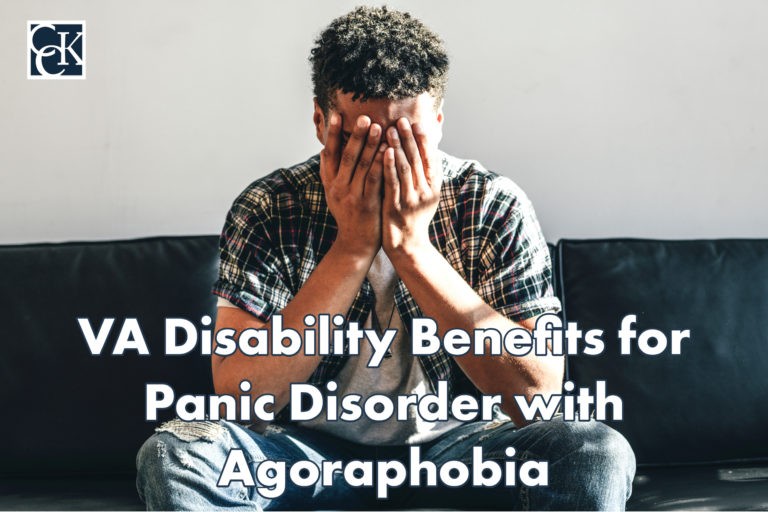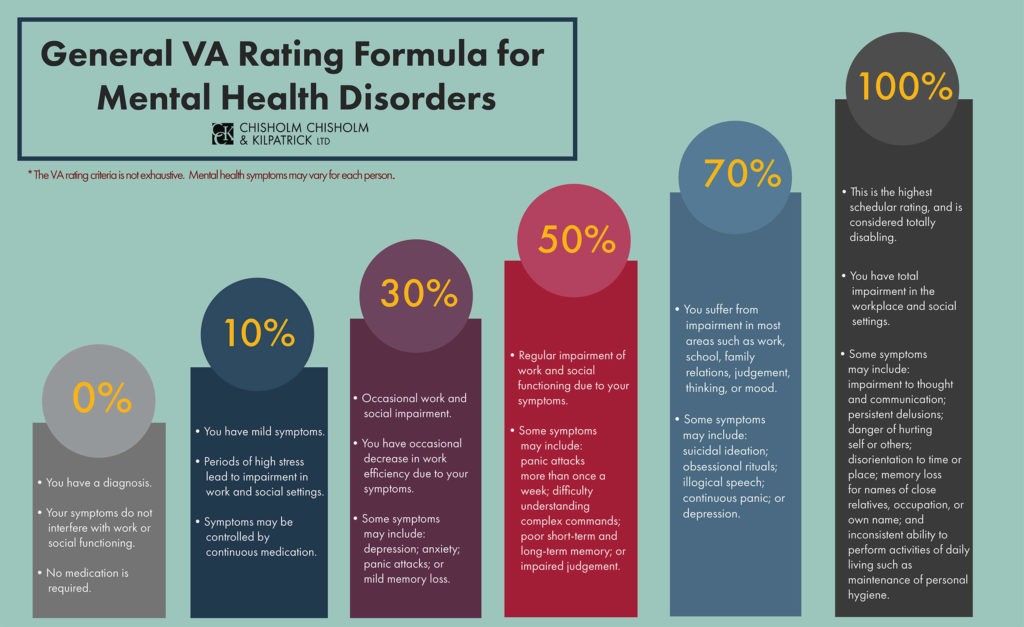VA Disability Benefits for Panic Disorder with Agoraphobia

CCK Law: Our Vital Role in Veterans Law
Panic disorder is often a debilitating condition that interferes with a person’s ability to live their day-to-day life. Often, the symptoms can be very severe and difficult to manage. Panic disorder is common among veterans, due to the nature of military service. Veterans who are diagnosed with panic disorder are eligible for compensation from VA.
What is Panic Disorder?
Panic disorder is a type of anxiety disorder which often causes panic attacks. Panic attacks are sudden feelings of intense fear and terror, even if there is no real danger or threat of real danger. These attacks can occur at any time, and often come without warning.
Symptoms of Panic Disorder
- Sense of impending doom or danger
- Fear of loss of control, going crazy, or death
- Rapid, pounding heart rate
- Sweating
- Trembling or shaking
- Shortness of breath or tightness in your throat
- Chills or hot flashes
- Nausea
- Chest pain
- Headache
- Dizziness, lightheadedness, or faintness
- Numbness or tingling sensation
- Feelings of unreality (depersonalization or derealization)
Additionally, panic disorder is often marked by an intense fear of experiencing another panic attack. Some people may fear having panic attacks so much that they avoid certain situations where they believe attacks may occur. Potential causes of panic disorder include genetics, major stress, temperament that is more sensitive to stress or prone to negative emotions, and certain changes in the way parts of your brain function. If left untreated, panic disorder can have a negative impact on daily functioning. Complications that panic attacks may cause or be linked to include:
- Development of specific phobias, such as fear of driving or leaving your home
- Frequent medical care for health concerns and other medical conditions
- Avoidance of social situations
- Problems at work or school
- Depression, anxiety disorders and other psychiatric disorders
- Increased risk of suicide or suicidal thoughts
- Alcohol or substance misuse
- Financial problems
What is Agoraphobia?
Agoraphobia is one of the aforementioned symptoms that can arise from panic disorder. Specifically, agoraphobia is a fear of being in situations where escape may be difficult or that help would not be available if things go wrong.
People with agoraphobia may have difficulty leaving their home, shopping, traveling, or being in any form of crowds. Oftentimes, people with agoraphobia will need to adapt their behavior, or lifestyle, to avoid situations which may trigger their agoraphobia or cause panic. This change in behavior is often referred to as avoidance.
Diagnosing Panic Disorder and Agoraphobia
To diagnose panic disorder, or agoraphobia, you will often need to speak with your primary care provider, a psychologist, or a psychiatrist. They may ask you about your symptoms, when they occur, and what may trigger them.
While it may be difficult to discuss these symptoms, it is often important to in order to receive a proper diagnosis. For example, you may need to discuss how you feel about leaving the house, what situations you avoid to prevent panicking, and what strategies you may employ to help cope with the symptoms of panic disorder.

How to Establish Service Connection for Panic Disorder with Agoraphobia
To establish service connection for panic disorder, with agoraphobia, a veteran will need to produce the following to VA:
- A current diagnosis of panic disorder;
- An in-service event or stressor that caused or contributed to the panic disorder; AND
- A medical nexus between the panic disorder and the in-service event or stressor.
As mentioned above, a current diagnosis of panic disorder can be ascertained from a physician or psychologist. However, further proof of a diagnosis can be shown through medical records.
One of the best ways to provide evidence for panic disorder is through service treatment records. Service treatment records will have documentation regarding any injury or illness that occurred while in service. This can include panic disorder or panic attacks if you were treated for them while on duty. These records can be very beneficial in proving that the condition resulted from service or as the result of service.
However, not all veterans have this type of evidence available to them. Many veterans do not seek treatment for panic attacks while in service, often out of fear of judgement, and thus this evidence may not exist.
In this case, lay statements from the veteran and/or their family members can be particularly effective. These statements can be used to describe both the onset and progression of the veteran’s disorder, as well as how it relates to their service.
Additionally, veterans will need a nexus. This is a statement from a qualified healthcare professional affirming that they believe your condition was “at least as likely as not” caused by your military service.
To establish service connection for panic disorder with agoraphobia, veterans will likely need the symptom of agoraphobia to be confirmed with a diagnosis and have a nexus that supports the symptom of agoraphobia.
How Does VA Rate Panic Disorder with Agoraphobia?
Mental health conditions are rated using VA’s General Rating Formula for Mental Disorders. Ratings can be assigned at 0, 10, 30, 50, 70, and 100 percent. Ratings are assigned based on symptoms, specifically the level of social and occupational impairment a veteran experiences. The severity of the symptoms is also taken into consideration.
For example, a veteran experiencing mild symptoms, or whose symptoms are well controlled by continuous medication, may receive a 10 percent disability rating for panic disorder. Veterans with more severe symptoms, such as near-continuous panic or depression affecting the ability to function independently, may receive a 100 percent disability rating. Self-injurious behaviors and suicide attempts are also consistent with a 100 percent rating.
As agoraphobia is a symptom of panic disorder, it can help contribute to a higher rating for a veteran’s panic disorder.

TDIU for Panic Disorder with Agoraphobia
TDIU, or total disability based on individual unemployability, is a monthly benefit available to veterans who are unable to work on account of their disability, or disabilities. This benefit compensates veterans at the 100 percent rating level, even if their overall combined rating level is less than that.
There are generally two ways to achieve TDIU: schedular and extraschedular.
In order to be eligible for Schedular TDIU, veterans must have one condition rated at 60 percent minimum OR two conditions that can be combined to reach 70 percent, where one condition is at minimum 40 percent. The criteria for schedular TDIU is outlined under 38 CFR § 4.16a. Ratings given for panic disorder with agoraphobia can contribute to schedular TDIU. Importantly, panic disorder with agoraphobia as a symptom can help veterans achieve the ratings necessary to obtain schedular TDIU. Since agoraphobia is a severe symptom of panic disorder, it may help boost a veteran’s panic disorder rating to at least 60 percent.
Veterans who do not meet the necessary criteria for schedular TDIU may be eligible for extraschedular TDIU. For this form of TDIU, veterans must prove that their condition(s) uniquely hinder their ability to maintain substantially gainful employment. Extraschedular TDIU is rated under 38 CFR § 4.16b.
Need Help with VA Benefits for Panic Disorder with Agoraphobia?
Sometimes it can be difficult to get agoraphobia confirmed as a symptom of panic disorder and veterans may have difficulty securing a rating for panic disorder with agoraphobia. If you need help getting VA benefits for your condition, the experienced veterans’ advocates at Chisholm, Chisholm & Kilpatrick may be able to help build your initial claim or appeal a denial from VA. Contact our office today for a free evaluation.
About the Author
Share this Post
